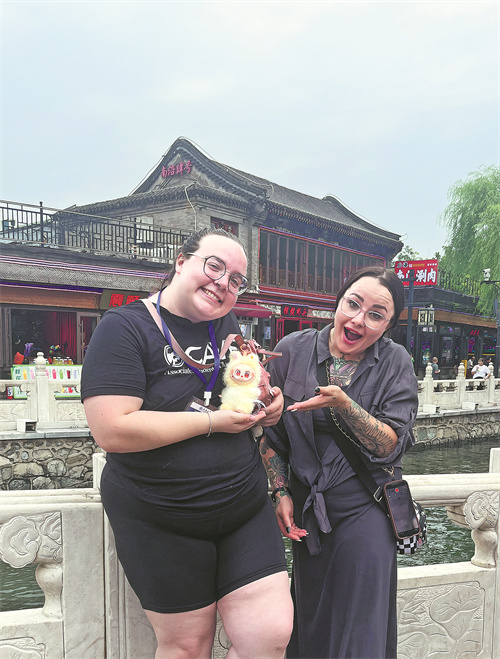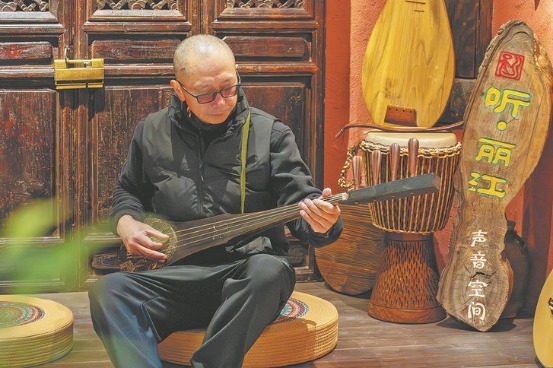Labubu craze takes over global culture


Last month, Jazzlyn Jasper, 23, a student from California State University in the United States, visited Beijing as part of 2025 Youth Talk China, a cultural exchange program. During her stay, she stopped by Wangfujing Street — one of the city's busiest shopping districts — where she purchased a Labubu toy, a fuzzy, fang-toothed character that has recently become a global sensation.
While Labubu's rise may seem sudden, the character actually dates back to 2015. It was created by Hong Kong-born illustrator Kasing Lung as part of his "The Monsters" collection — a set of characters inspired by Dutch and Nordic folklore.
Now, Labubu is riding a wave of global interest, especially as a collectible bag charm. The hashtag#Labubu has appeared more than 1 million times on TikTok.
"In America, Labubu toys are really popular right now," Jasper said. "A Pop Mart store even opened in the mall near my home. The toys have been sold out everywhere, so seeing them here in Beijing is super fun. I thought, 'Oh, I will get one too.'"
Holding up her yellow Labubu, which she got from a blind box, Jasper beamed with excitement — a reflection of the toy's quirky charm that has captured hearts across generations and cultures.
Pop Mart, the company behind Labubu, now operates in over 30 countries, with more than 550 stores and pop-up locations, according to 9 News. On July 19, in Melbourne's chilly winter, the grand opening of Pop Mart's new store on Bourke Street underscored the character's worldwide appeal. The sidewalk outside the store was lined with camping chairs and sleeping bags.
"By morning, the line stretched as far as I could see — all just to get a limited-edition Labubu doll," said Wang Anyu, 25, a Chinese student studying in Australia.
To meet growing demand, Pop Mart is rapidly expanding its retail footprint across North America and Europe, opening stores and deploying its signature vending machines, known as "Roboshops", according to S&P Global.
"Labubu's appeal lies partly in its aesthetic — a blend of maximalist and 'ugly-cute' styles that resonate deeply with Western youth," said Kiara Amato, 20, a student at La Rochelle University in France. "The toy's 'devilish' grin and quirky fangs match the 'bad angel' archetype popular in alternative fashion scenes. Labubu looks a bit evil — not like a Disney baby — but it's cute in its own way."
Beyond the toy
Celebrity endorsements have been another major factor driving Labubu's breakthrough in Western markets. "Celebrities have played an outsize role," confirmed Jasper.
In April 2024, for example, Blackpink's Lisa was seen with a Labubu dangling from her luxury handbag, igniting a global trend. Soon after, NBA star Dillon Brooks and soccer icon David Beckham were also spotted with Labubu accessories, and Beckham later shared an Instagram photo of a Labubu gifted to him by his daughter.
This kind of high-profile exposure helped propel Labubu into mainstream culture, allowing it to transcend its role as a toy.
"Its cultural flexibility makes it a canvas onto which collectors project meaning — from high-fashion statements to nostalgic comfort," said Addison Winslow, a councilmember from Chicago, California. "Labubu now sits at the intersection of art, fashion, and commerce."
Interestingly, Labubu's primary fan base in the West is not children, but adults. In 2024, buyers aged 18 and over contributed to a year-over-year increase of more than $800 million in the US toy market, according to market research firm Circana.
The hype has even reached the fashion rental market. "With fashion rental gaining momentum, you can now rent Labubu by the day in the UK," said Alexander Hughes, a student at the University of Edinburgh. "Trends may not last forever, so renting one to match an outfit is smarter than buying."
Rental platforms like By Rotation in the UK offer Labubu dolls for £3 ($3.98) per day, while Hurr lists premium versions starting from £22, according to The Independent.
"Labubu's global boom illustrates a fusion of culture and commerce — combining original Chinese IP with Western consumerism, celebrity power, and social media virality," noted Winslow.




































